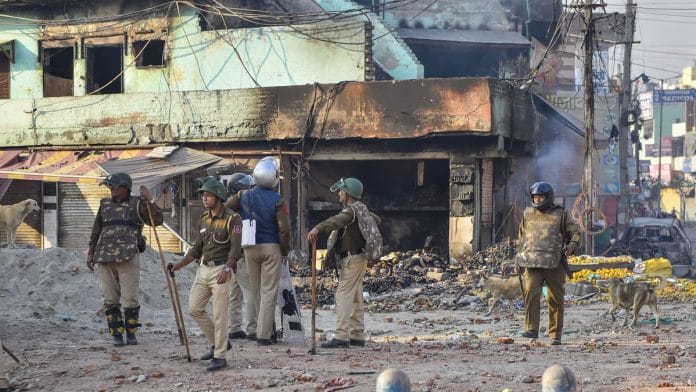New Delhi: In a rare move, a Delhi court hearing the 2020 northeast Delhi riots cases Tuesday ordered two separate trials in one FIR where the police have named both Muslims and Hindus as accused.
Calling it a peculiar situation, additional sessions judge Vinod Yadav observed the case has an “assortment of accused” from different religions, purportedly acting under two different conspiracies and unlawful assemblies.
“This is definitely going to prejudice the defense of accused from different religions,” the judge said.
Taking a cue from a Gujarat High Court order that authorised separation of trial in a case having accused from two different communities, the judge went ahead to order segregation of the trial in the case before him.
“Bearing in mind the aforesaid judicial precedent (by the Gujarat HC), this court also deems it appropriate to separate trial of the accused so that their defence may not even likely to get prejudiced,” ordered the court.
The direction came as additional sessions judge Yadav framed charges against three Hindus and two Muslims for the murder of a 24-year-old man killed during the riots.
While separating the trial, the judge directed the Deputy Commissioner of Police (Crime Branch), Joy Tirkey, to furnish a complete set of the charge sheet in physical form to the court within two weeks. This charge sheet would be allotted a new number and treated as a final police report for the Hindus accused in the case. The one already filed by the police in the case would be used for the trial of the Muslims named in the FIR.
Not the first time
This is not the first time the court has spoken about Muslims and Hindus being named as accused in an FIR related to the communal riots.
While framing charges against the five accused, the judge said there was enough material on record against them. It charged them for rioting, rioting and armed with deadly weapon, member of unlawful assembly, vilification or attacks upon religion and murder, among other IPC offences. All the accused pleaded not guilty and claimed trial in the case.
In December 2020, the same judge had granted bail to a Muslim man, observing it did not “appeal to the senses” that the accused, being a Muslim, “would rub shoulder to shoulder in such a surcharged atmosphere with the members of an unlawful assembly – which mainly consisted of persons from the Hindu community, and would beat a Muslim boy to death.”
“It is very obfuscatory that a Muslim boy would become part of an ‘unlawful assembly’ which mostly consisted of members of the Hindu community, the common object whereof was to cause maximum damage to the property, life and limb(s) of the other community. So, prima facie, the applicant (Aarif) cannot be said to be part of ‘unlawful assembly’ or share ‘common object’ with them on the date of incident,” the court had noted, while enlarging one Arif on bail.
Also read: In riots case, trial court says Delhi Police probe not good enough, slams ‘half-baked’ efforts






